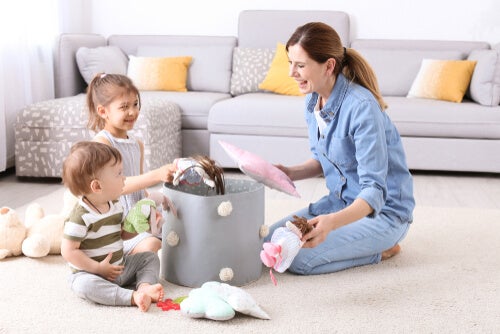COVID-19: Five Psychological Effects of Confinement and How to Manage Them

Several countries have already implemented a lockdown. Some do it with very rigid protocols, while, in other countries, the measures have been more flexible. However, what are the psychological effects of confinement and how can you deal with them?
The goal is to protect ourselves and to stop the rate of COVID-19 infections. However, there’s another decisive factor that we all need to address: the psychological effects of the COVID-19 lockdown.
In order to manage your day-to-day life in the best possible way, you have no choice but to accept it and adopt a series of mental strategies. We’d all love for there to be a perfect solution that encompasses everyone but there isn’t one. Each person will have to find their own way of dealing with it, as well as the resulting consequences.
The only scientific references that we have about similar experiences were published recently by the journal The Lancet. In this research, they analyzed the lockdowns of recent decades as a result of SARS 2003, Ebola, influenza H1N1, or the MERS. In all of these lockdowns, the effects of psychological distress were evident.
Therefore, it’s necessary to know more about them in order to try to face our current situation, deal with it, and reduce its impact. With relevant information and resources, we’ll all be able to deal with this situation in a much better way and support each other at the same time.

Five psychological effects of confinement
No one prepared us for such a pandemic. Many people are in denial that this is really happening. They look out their windows and find it difficult to accept that what’s happening is real.
This is completely normal and is another step in the very delicate process of acceptance. It’s a matter of accepting that we’re facing a very difficult, unexpected, and unprecedented situation.
Does this mean that, because you haven’t gone through it before, you should feel any less prepared? The answer is no. You can be prepared for almost anything as long as you accept reality.
The best defense against any circumstance is information and the ability to react. Thus, you should have a look at the psychological effects of lockdown that people can suffer and what to do about them.
1. The anguish of uncertainty. How long will this last?
The worst enemy in adverse scenarios is uncertainty – not knowing what’s going to happen. At present, no one knows how many days or weeks our confinement will last in order to reduce the infection curve. Therefore, you need to take this fact into account.
Anxiety feeds on questions and uncertainty. If you continually ask yourself how much longer you’re going to be shut in, you’ll worsen your anxiety. Thus, you shouldn’t feed your anxious mind.
Simply remember why we’re all in confinement: in order to reduce infections, protect ourselves, and protect the most vulnerable people.
Focus on the present. It’s the only thing that matters, as well as looking after yourself and others.
Occupy your mind and train it to focus on the present. Read, watch TV series and movies, do puzzles, and talk to your friends and family.
2. Fear of infection and fear of losing a loved one
One of the most obvious psychological effects of confinement is the fear of infection. In fact, sometimes, you may find it more frightening to think that a loved one may become infected. How can you handle those thoughts?
You have to accept that fear and validate it but without panicking. The disease is contagious and people have died from it. Once you accept this fact, you’ll have resources at your disposal to deal with it more effectively.
If you’re afraid of contagion, then take the necessary measures to avoid it. However, don’t do this to the point of developing obsessive-compulsive behaviors. Likewise, in order to reduce (as far as possible) the fear of people close to you becoming infected, you can use the same strategy. Protect them and remind them to look after themselves.
On the other hand, if you’ve tested positive for COVID-19, you should bear in mind that, in a large number of cases, you can recover from the disease at home by taking appropriate isolation measures. You just have to be aware of the symptoms at all times.

3. Stress due to lack of social contact
People are social beings, used to habits and routines. When these habits suddenly disappear from one day to the next, the brain goes into alarm mode and experiences stress.
This sudden and unexpected change can be managed well for five to ten days. However, after approximately 12 days, you can feel the stress and distress increasing.
You’ll be missing a lot of people, including the family members that you can’t have close to you. You’ll miss your routines. What can you do?
In this situation, technology is one of your best allies. Calls, messages, and video calls will become your daily sustenance.
On the other hand, you need to relieve the anguish that your brain will experience. To do this, it’s essential for you to have clear routines for work at home, leisure time, rest time, and exercise.
4. What will happen to me when this is over?
When this pandemic ends, we’ll all enter the post-coronavirus era. One of the effects associated with lockdown is that you’ll probably ask what will happen to you. Will you lose your job? What will become of the global economy? And what will you do if you lose a loved one?
The psychological anguish of thinking about the future can be immense. However, you must rationalize and avoid thinking about negative events that haven’t happened yet.
Dealing with confinement means that you have to control your mind. To do that, you have to focus on the here and now. Remember that the only thing that matters right now is taking care of yourself and those around you.

5. The burden of living together at home or in solitary confinement
We all know it. Being confined at home with other family members can be either a blessing or a curse. It isn’t easy to spend so much time together under the same roof. If you have children, you’ll have to deal with their boredom and you’ll have to try to cheer them up in these difficult days.
The key in these circumstances is your attitude. If you keep a constructive and positive approach, you’ll strengthen the bonds with your family.
Use your creativity to make each day different. Being together and looking after each other is the best thing you can do. However, you mustn’t forget that all the other people you know are also spending these days in complete solitude.
In these cases, it’s vital for you to keep in touch with them through technology. Conversations, messages, and video calls should be an important part of your day so that you feel connected, supported, and loved from a distance.
In conclusion, we know that this situation will demand the best of all of us. Thus, you should be prepared, take the psychological effects of confinement into account, and learn to manage them.
Several countries have already implemented a lockdown. Some do it with very rigid protocols, while, in other countries, the measures have been more flexible. However, what are the psychological effects of confinement and how can you deal with them?
The goal is to protect ourselves and to stop the rate of COVID-19 infections. However, there’s another decisive factor that we all need to address: the psychological effects of the COVID-19 lockdown.
In order to manage your day-to-day life in the best possible way, you have no choice but to accept it and adopt a series of mental strategies. We’d all love for there to be a perfect solution that encompasses everyone but there isn’t one. Each person will have to find their own way of dealing with it, as well as the resulting consequences.
The only scientific references that we have about similar experiences were published recently by the journal The Lancet. In this research, they analyzed the lockdowns of recent decades as a result of SARS 2003, Ebola, influenza H1N1, or the MERS. In all of these lockdowns, the effects of psychological distress were evident.
Therefore, it’s necessary to know more about them in order to try to face our current situation, deal with it, and reduce its impact. With relevant information and resources, we’ll all be able to deal with this situation in a much better way and support each other at the same time.

Five psychological effects of confinement
No one prepared us for such a pandemic. Many people are in denial that this is really happening. They look out their windows and find it difficult to accept that what’s happening is real.
This is completely normal and is another step in the very delicate process of acceptance. It’s a matter of accepting that we’re facing a very difficult, unexpected, and unprecedented situation.
Does this mean that, because you haven’t gone through it before, you should feel any less prepared? The answer is no. You can be prepared for almost anything as long as you accept reality.
The best defense against any circumstance is information and the ability to react. Thus, you should have a look at the psychological effects of lockdown that people can suffer and what to do about them.
1. The anguish of uncertainty. How long will this last?
The worst enemy in adverse scenarios is uncertainty – not knowing what’s going to happen. At present, no one knows how many days or weeks our confinement will last in order to reduce the infection curve. Therefore, you need to take this fact into account.
Anxiety feeds on questions and uncertainty. If you continually ask yourself how much longer you’re going to be shut in, you’ll worsen your anxiety. Thus, you shouldn’t feed your anxious mind.
Simply remember why we’re all in confinement: in order to reduce infections, protect ourselves, and protect the most vulnerable people.
Focus on the present. It’s the only thing that matters, as well as looking after yourself and others.
Occupy your mind and train it to focus on the present. Read, watch TV series and movies, do puzzles, and talk to your friends and family.
2. Fear of infection and fear of losing a loved one
One of the most obvious psychological effects of confinement is the fear of infection. In fact, sometimes, you may find it more frightening to think that a loved one may become infected. How can you handle those thoughts?
You have to accept that fear and validate it but without panicking. The disease is contagious and people have died from it. Once you accept this fact, you’ll have resources at your disposal to deal with it more effectively.
If you’re afraid of contagion, then take the necessary measures to avoid it. However, don’t do this to the point of developing obsessive-compulsive behaviors. Likewise, in order to reduce (as far as possible) the fear of people close to you becoming infected, you can use the same strategy. Protect them and remind them to look after themselves.
On the other hand, if you’ve tested positive for COVID-19, you should bear in mind that, in a large number of cases, you can recover from the disease at home by taking appropriate isolation measures. You just have to be aware of the symptoms at all times.

3. Stress due to lack of social contact
People are social beings, used to habits and routines. When these habits suddenly disappear from one day to the next, the brain goes into alarm mode and experiences stress.
This sudden and unexpected change can be managed well for five to ten days. However, after approximately 12 days, you can feel the stress and distress increasing.
You’ll be missing a lot of people, including the family members that you can’t have close to you. You’ll miss your routines. What can you do?
In this situation, technology is one of your best allies. Calls, messages, and video calls will become your daily sustenance.
On the other hand, you need to relieve the anguish that your brain will experience. To do this, it’s essential for you to have clear routines for work at home, leisure time, rest time, and exercise.
4. What will happen to me when this is over?
When this pandemic ends, we’ll all enter the post-coronavirus era. One of the effects associated with lockdown is that you’ll probably ask what will happen to you. Will you lose your job? What will become of the global economy? And what will you do if you lose a loved one?
The psychological anguish of thinking about the future can be immense. However, you must rationalize and avoid thinking about negative events that haven’t happened yet.
Dealing with confinement means that you have to control your mind. To do that, you have to focus on the here and now. Remember that the only thing that matters right now is taking care of yourself and those around you.

5. The burden of living together at home or in solitary confinement
We all know it. Being confined at home with other family members can be either a blessing or a curse. It isn’t easy to spend so much time together under the same roof. If you have children, you’ll have to deal with their boredom and you’ll have to try to cheer them up in these difficult days.
The key in these circumstances is your attitude. If you keep a constructive and positive approach, you’ll strengthen the bonds with your family.
Use your creativity to make each day different. Being together and looking after each other is the best thing you can do. However, you mustn’t forget that all the other people you know are also spending these days in complete solitude.
In these cases, it’s vital for you to keep in touch with them through technology. Conversations, messages, and video calls should be an important part of your day so that you feel connected, supported, and loved from a distance.
In conclusion, we know that this situation will demand the best of all of us. Thus, you should be prepared, take the psychological effects of confinement into account, and learn to manage them.
This text is provided for informational purposes only and does not replace consultation with a professional. If in doubt, consult your specialist.







